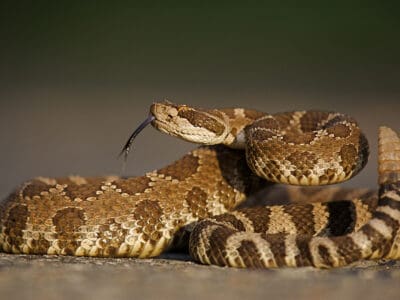Alligator vs Elephant: Who Would Win in a Fight?
Alligators and elephants are two creatures that live hemispheres apart. Although they live too far away to ever battle each other in real life, that doesn’t mean we can’t imagine what would happen in an alligator vs elephant fight. We can use information about their physical features and fighting methods along with educated guesses to figure out how this fight would play out.
So, what would happen if this mean reptile ever crossed paths with an irritated elephant? We’ll lay it all out for you.
Comparing an Alligator and an Elephant
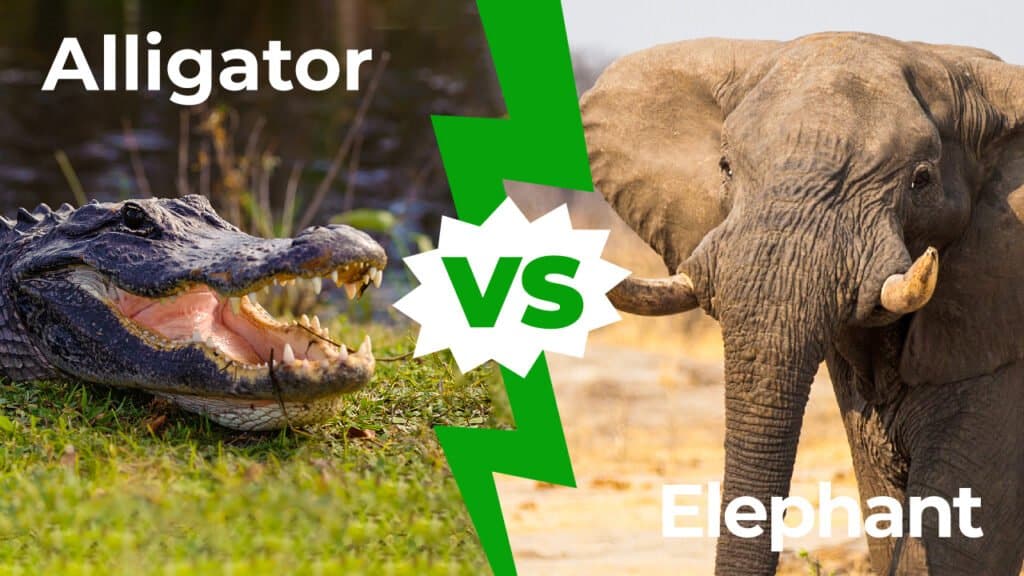
A-Z-Animals.com
| Alligator | Elephant | |
| Size | Weight: 400lbs to 800lbs (sometimes more) Height: 1ft – 2ft off the ground Length: 8.2 feet to 11.2 feet long |
Weight: 6,500lbs – 12,000lbs Height: 7ft – 12ft at the shoulder Length: 18ft – 21ft |
| Speed and Movement Type | – 30 mph over short distances on land – Locomotion includes swimming and quick scampers on the ground. |
– 9-25 mph – Capable of charging |
| Bite Power and Teeth | – 2,980 PSI bite power – Roughly 80 teeth – Teeth roughly 2” in length |
-Elephants have weak teeth and do not use them for defense. |
| Senses | – Poor vision in water due to protective membrane – Good sight on land – Highly receptive to vibrations – Strong sense of smell. |
– Great hearing – Poor vision – Can sniff out food miles away |
| Defenses | – Camouflage – Speed – Hissing threat display |
– Massive size scares away predators as an adult – Tough skin |
| Offensive Capabilities | – Powerful bite – Death roll can instantly amputate – Speed allows for devastatingly quick attacks to occur |
– Tusks can impale enemies – Devastating stomp attacks – Can use head and trunk to tip enemies over – High intelligence makes them wary of others and careful |
| Predatory Behavior | – Ambush prey by keeping eyes and nostrils above water – Clamp onto enemies and use a death roll |
– Non-predator but will fiercely attack encroachers – Grazes for much of the day |
The Key Factors in a Fight Between an Alligator and an Elephant
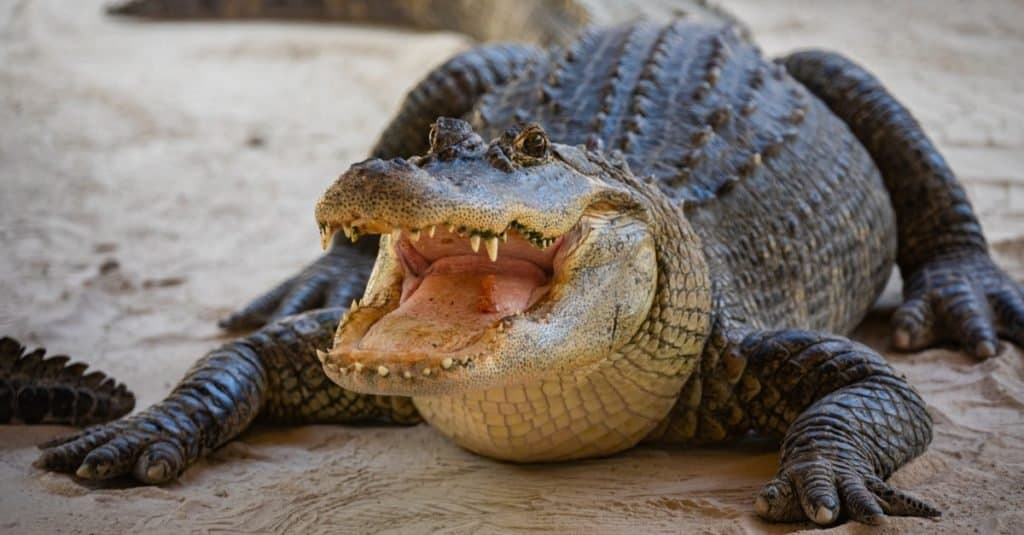
Mia2you/Shutterstock.com
We do not need to examine every piece of data about alligators and elephants to get a good idea of which one would win in a fight. Instead, the better method of seeing which creature would kill the other is to examine the physical components of both as well as the ways they attack enemies.
By considering these two overarching facets of the comparison, we’ll gain enough insight to determine if the reptile or mammal walks away from this fight.
Physical Features of Alligators and Elephants
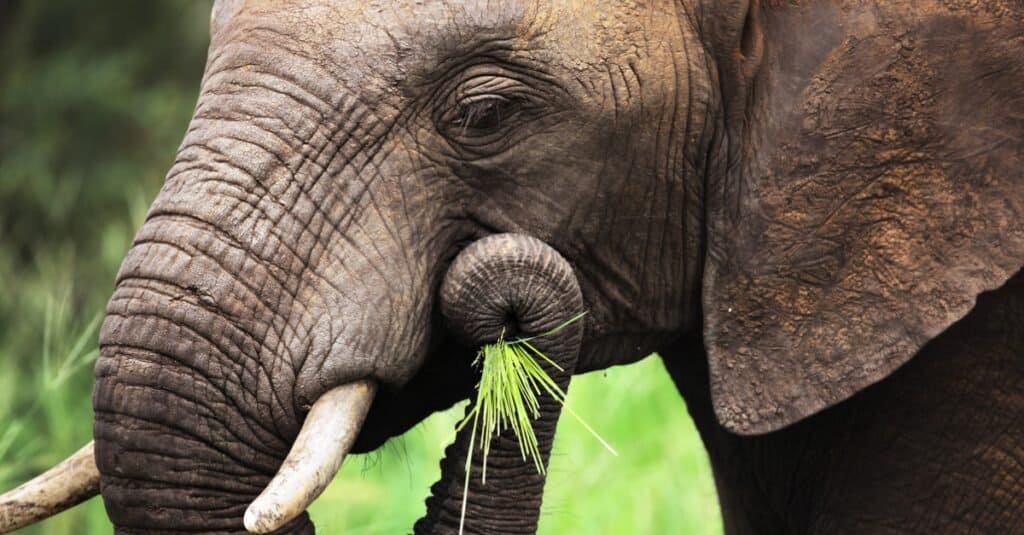
iStock.com/johan63
The alligator is an aggressive reptile that has been relatively unchanged for some time on an evolutionary level; it’s an amazing predator. The elephant is a large, lumbering mammal that only wants to find food and water while caring for its herd.
Take a look at what physical components would come into play if these two were to meet and fight to the death.
Alligator vs Elephant: Size
An alligator is very large for a reptile, sometimes weighing up to 800lbs and measuring 11 feet long. This creature can take down large prey, including deer. In fact, the largest alligator on record was a 1,380 pounds, which shows the size alligators can attain.
However, it is tiny compared to an elephant that stands 12 feet tall, taller than an alligator is long. Elephants also weigh upwards of 12,000 pounds, over 10 times the amount of an alligator. While the largest alligator ever was large, the biggest elephant on record was truly massive and weighed about 24,000 pounds!
The elephant gets the size advantage.
Alligator vs Elephant: Speed and Movement
Although it has stubby legs, an alligator can reach 30mph over very short distances. It uses a scampering form of locomotion on the ground and swims very well. An elephant can only run at 25mph, but it’s capable of running that distance for much longer.
We’ll call speed and movement a tie since the alligator is technically faster but lacks durability.
Alligator vs Elephant: Bite Power and Teeth
The elephant doesn’t have much in the way of bite power since it is an herbivore. However, the alligator has a lot of biting power, upwards of 2,900 PSI of bite strength that drives 2” teeth into the enemies. The biting power of an alligator is enough to clamp down so hard that the enemy can’t escape, allowing the gator to perform a “death roll.”
The alligator gets the advantage in terms of bite power and teeth.
Alligator vs Elephant: Senses
An elephant has great hearing and a wonderful sense of smell, but it has a lackluster sense of vision. The alligator’s vision in water is clouded by a protective membrane, but it’s good on land. They have a strong sense of smell and are highly receptive to vibrations in the water.
The senses of an alligator and elephant just about equal one another, so they’re a tie.
Alligator vs Elephant: Physical Defenses
The alligator relies on using its camouflage, speed, and scary threat display to ward off foes, but it’s not always successful. The elephant uses its immense size and thick skin to drive off threats, and that tends to work very well. In fact, once an elephant reaches its adult size, few creatures actively pursue it as prey.
The alligator has a more diverse array of defenses, but the elephant’s singular defense is more impressive.
The elephant gets the advantage for physical defenses.
Combat Skills of Alligators and Elephants

iStock.com/tobiasfrei
The physical elements of an animal are just one part of the equation in a fight. Predatory instincts and the ability to use one’s advantages to kill another creature are also important in a fight between two animals.
We’re going to compare the elephant and alligator to see which one has superior combat skills.
Alligator vs Elephant: Offensive Capabilities
The elephant has two basic offensive capabilities. It will roll an enemy over by using its trunk and head to gore its victim, or the elephant will roll it and then stomp it to death. These methods are simple but effective.
The alligator has a devastating bite. An alligator will bite an enemy, clamp down, and begin a death roll. Basically, the creature grabs a piece of its prey and rolls until it comes off, leading to dismemberment or large chunks of flesh being torn from the animal’s body.
Both creatures are incredibly capable killers, so offensive capabilities are a tie.
Alligator vs Elephant: Predatory Behaviors
The elephant has no predatory behaviors. It’s a natural grazer that only attacks when something enters its territory. Alligators are elite ambush predators, waiting on the water’s edge for prey to take a drink and then lunging at them, dragging them into the depths while inflicting bites or initiating a death roll.
Alligators can also chase down prey on land just as easily, using a burst of speed to secure a kill.
All in all, the alligator gets the predatory behavior advantage.
What Are Key Differences Between an Alligator and an Elephant?

Elephants are mammals that weigh up to 12,000lbs and stand about 12 feet tall, and alligators are reptiles that are about 11 feet long and weigh up to 800lbs. Alligators are predators while elephants are grazers.
Alligators are known to use their bites to kill prey, but elephants use their feet or tusks to kill other animals. Elephants bathe in water and coat themselves in mud, but they spend most of their time on land. The alligator is a semi-aquatic reptile that spends significant amounts of time in the water.
These are the key differences between these two creatures.
Who Would Win in a Fight Between an Alligator and an Elephant?
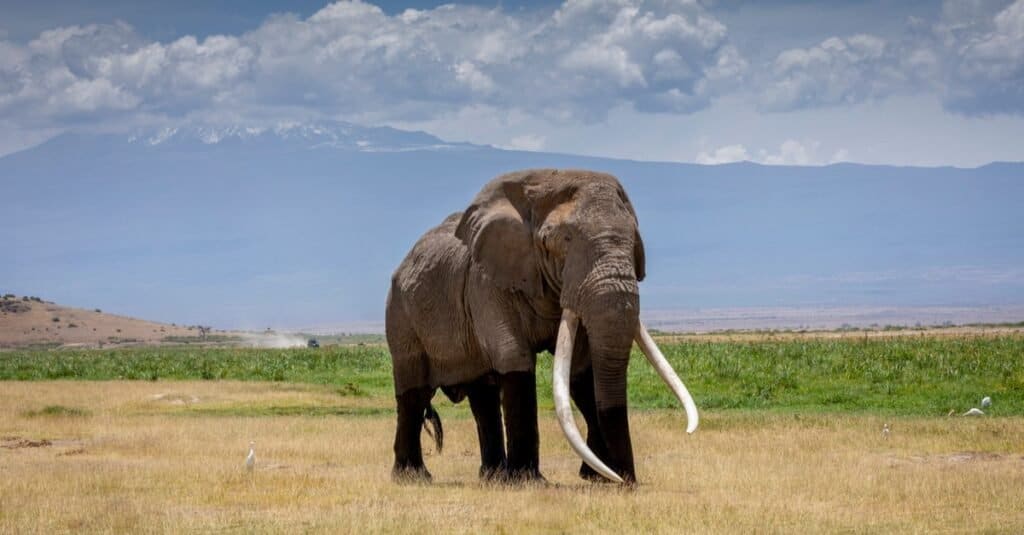
Stu Porter/Shutterstock.com
An elephant would win a fight against an alligator. Alligators are too prone to stomp attacks from an elephant, and they cannot inflict fatal wounds on an elephant. They can’t bite and death-roll an elephant’s leg, and they certainly can’t reach an elephant’s head.
The fight would likely begin with an alligator biting an elephant on the trunk or head as it takes a drink of water in a hot environment. The elephant, enraged and in pain, would move its head back and forth, eventually shaking off the alligator.
From that point on, it’s all downhill for the reptile. The elephant would flip it into the air, goring it with its powerful tusks. As it lays in the mud, the angry elephant would stomp it to death, leaving it a smashed ruin.
Elephants regularly kill the alligator’s much larger, tougher cousin, the crocodile.
More from A-Z Animals
Alligators and elephants are two creatures that live hemispheres apart. Although they live too far away to ever battle each other in real life, that doesn’t mean we can’t imagine what would happen in an alligator vs elephant fight. We can use information about their physical features and fighting methods along with educated guesses to figure out how this fight would play out.
So, what would happen if this mean reptile ever crossed paths with an irritated elephant? We’ll lay it all out for you.
Comparing an Alligator and an Elephant

A-Z-Animals.com
| Alligator | Elephant | |
| Size | Weight: 400lbs to 800lbs (sometimes more) Height: 1ft – 2ft off the ground Length: 8.2 feet to 11.2 feet long |
Weight: 6,500lbs – 12,000lbs Height: 7ft – 12ft at the shoulder Length: 18ft – 21ft |
| Speed and Movement Type | – 30 mph over short distances on land – Locomotion includes swimming and quick scampers on the ground. |
– 9-25 mph – Capable of charging |
| Bite Power and Teeth | – 2,980 PSI bite power – Roughly 80 teeth – Teeth roughly 2” in length |
-Elephants have weak teeth and do not use them for defense. |
| Senses | – Poor vision in water due to protective membrane – Good sight on land – Highly receptive to vibrations – Strong sense of smell. |
– Great hearing – Poor vision – Can sniff out food miles away |
| Defenses | – Camouflage – Speed – Hissing threat display |
– Massive size scares away predators as an adult – Tough skin |
| Offensive Capabilities | – Powerful bite – Death roll can instantly amputate – Speed allows for devastatingly quick attacks to occur |
– Tusks can impale enemies – Devastating stomp attacks – Can use head and trunk to tip enemies over – High intelligence makes them wary of others and careful |
| Predatory Behavior | – Ambush prey by keeping eyes and nostrils above water – Clamp onto enemies and use a death roll |
– Non-predator but will fiercely attack encroachers – Grazes for much of the day |
The Key Factors in a Fight Between an Alligator and an Elephant

Mia2you/Shutterstock.com
We do not need to examine every piece of data about alligators and elephants to get a good idea of which one would win in a fight. Instead, the better method of seeing which creature would kill the other is to examine the physical components of both as well as the ways they attack enemies.
By considering these two overarching facets of the comparison, we’ll gain enough insight to determine if the reptile or mammal walks away from this fight.
Physical Features of Alligators and Elephants

iStock.com/johan63
The alligator is an aggressive reptile that has been relatively unchanged for some time on an evolutionary level; it’s an amazing predator. The elephant is a large, lumbering mammal that only wants to find food and water while caring for its herd.
Take a look at what physical components would come into play if these two were to meet and fight to the death.
Alligator vs Elephant: Size
An alligator is very large for a reptile, sometimes weighing up to 800lbs and measuring 11 feet long. This creature can take down large prey, including deer. In fact, the largest alligator on record was a 1,380 pounds, which shows the size alligators can attain.
However, it is tiny compared to an elephant that stands 12 feet tall, taller than an alligator is long. Elephants also weigh upwards of 12,000 pounds, over 10 times the amount of an alligator. While the largest alligator ever was large, the biggest elephant on record was truly massive and weighed about 24,000 pounds!
The elephant gets the size advantage.
Alligator vs Elephant: Speed and Movement
Although it has stubby legs, an alligator can reach 30mph over very short distances. It uses a scampering form of locomotion on the ground and swims very well. An elephant can only run at 25mph, but it’s capable of running that distance for much longer.
We’ll call speed and movement a tie since the alligator is technically faster but lacks durability.
Alligator vs Elephant: Bite Power and Teeth
The elephant doesn’t have much in the way of bite power since it is an herbivore. However, the alligator has a lot of biting power, upwards of 2,900 PSI of bite strength that drives 2” teeth into the enemies. The biting power of an alligator is enough to clamp down so hard that the enemy can’t escape, allowing the gator to perform a “death roll.”
The alligator gets the advantage in terms of bite power and teeth.
Alligator vs Elephant: Senses
An elephant has great hearing and a wonderful sense of smell, but it has a lackluster sense of vision. The alligator’s vision in water is clouded by a protective membrane, but it’s good on land. They have a strong sense of smell and are highly receptive to vibrations in the water.
The senses of an alligator and elephant just about equal one another, so they’re a tie.
Alligator vs Elephant: Physical Defenses
The alligator relies on using its camouflage, speed, and scary threat display to ward off foes, but it’s not always successful. The elephant uses its immense size and thick skin to drive off threats, and that tends to work very well. In fact, once an elephant reaches its adult size, few creatures actively pursue it as prey.
The alligator has a more diverse array of defenses, but the elephant’s singular defense is more impressive.
The elephant gets the advantage for physical defenses.
Combat Skills of Alligators and Elephants

iStock.com/tobiasfrei
The physical elements of an animal are just one part of the equation in a fight. Predatory instincts and the ability to use one’s advantages to kill another creature are also important in a fight between two animals.
We’re going to compare the elephant and alligator to see which one has superior combat skills.
Alligator vs Elephant: Offensive Capabilities
The elephant has two basic offensive capabilities. It will roll an enemy over by using its trunk and head to gore its victim, or the elephant will roll it and then stomp it to death. These methods are simple but effective.
The alligator has a devastating bite. An alligator will bite an enemy, clamp down, and begin a death roll. Basically, the creature grabs a piece of its prey and rolls until it comes off, leading to dismemberment or large chunks of flesh being torn from the animal’s body.
Both creatures are incredibly capable killers, so offensive capabilities are a tie.
Alligator vs Elephant: Predatory Behaviors
The elephant has no predatory behaviors. It’s a natural grazer that only attacks when something enters its territory. Alligators are elite ambush predators, waiting on the water’s edge for prey to take a drink and then lunging at them, dragging them into the depths while inflicting bites or initiating a death roll.
Alligators can also chase down prey on land just as easily, using a burst of speed to secure a kill.
All in all, the alligator gets the predatory behavior advantage.
What Are Key Differences Between an Alligator and an Elephant?

Elephants are mammals that weigh up to 12,000lbs and stand about 12 feet tall, and alligators are reptiles that are about 11 feet long and weigh up to 800lbs. Alligators are predators while elephants are grazers.
Alligators are known to use their bites to kill prey, but elephants use their feet or tusks to kill other animals. Elephants bathe in water and coat themselves in mud, but they spend most of their time on land. The alligator is a semi-aquatic reptile that spends significant amounts of time in the water.
These are the key differences between these two creatures.
Who Would Win in a Fight Between an Alligator and an Elephant?

Stu Porter/Shutterstock.com
An elephant would win a fight against an alligator. Alligators are too prone to stomp attacks from an elephant, and they cannot inflict fatal wounds on an elephant. They can’t bite and death-roll an elephant’s leg, and they certainly can’t reach an elephant’s head.
The fight would likely begin with an alligator biting an elephant on the trunk or head as it takes a drink of water in a hot environment. The elephant, enraged and in pain, would move its head back and forth, eventually shaking off the alligator.
From that point on, it’s all downhill for the reptile. The elephant would flip it into the air, goring it with its powerful tusks. As it lays in the mud, the angry elephant would stomp it to death, leaving it a smashed ruin.
Elephants regularly kill the alligator’s much larger, tougher cousin, the crocodile.

